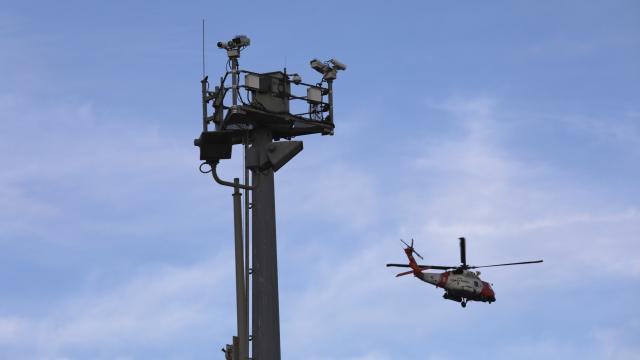Hoping to colour President Trump’s wall as a “medieval” solution to border security, Democratic leaders have offered up what they hope Americans view as a more suitable, 21st-century alternative. This so-called “technological wall” or “virtual fence” (they’re still working on the branding) would, first, cost significantly less. We could be talking about the difference between hundreds of millions of dollars and tens of billions.
What’s more, the tech-wall (or whatever) would not involve seizing huge swaths of private land from American ranchers and farmers and others with property along the invisible, 3,000-kilometer boundary between the United States and Mexico. It would also do considerably less harm to the ecosystem.
But for all the “pros” the Democrats’ plan checks off, the reality is that House Speaker Nancy Pelosi is proposing a huge and costly expansion of invasive surveillance tactics along the U.S. border. And this presumably includes a wide range of unfriendly tech that will sweep up data on innocent Americans and other people who aren’t actually breaking the law.
For many privacy experts, this is an unacceptably high price to pay just to politically paint Trump’s solution (which apparently now includes a “human wall,” whatever the hell that is) as neolithic by comparison. And so on Tuesday, 25 digital and human rights organisations sent a letter to Speaker Pelosi, Minority Leader Kevin McCarthy, and other Democratic leaders, letting them know that their idea is, well, bad. (Pelosi’s office didn’t respond to a request for comment.)
Here are the key points offered in the letter—which was signed by among other groups, Fight for the Future, Electronic Frontier Foundation, RAICES, ACLU, Demand Progress, New America’s Open Technology Institute, The Project on Government Oversight, SumOfUs, and the American-Arab Anti-Discrimination Committee:
Risk-based targeting: The proposal calls for “an expansion of risk-based targeting of passengers and cargo entering the United States.” We are concerned that this includes the expansion of programs — proven to be ineffective and to exacerbate racial profiling — that use mathematical analytics to make targeting determinations. All too often, these systems replicate the biases of their programmers, burden vulnerable communities, lack democratic transparency, and encourage the collection and analysis of ever-increasing amounts of data in order to generate risk assessments. We oppose the replication and expansion of risk-based systems that have exacerbated current racial disparities in immigration enforcement.
Mass surveillance: The proposal calls for “an expansion of CBP’s air and marine operations along the border.” We are concerned this means an increase in the deployment of aircraft with wide-area surveillance capabilities. Such aircraft, including unmanned drones, often include the power to capture the faces and licence plates of vast numbers of people who live and work near the border.
The government may scrutinize this personal information with machine-learning techniques susceptible to the same biases and problems listed above. Vendors already are applying artificial intelligence software to images captured by mounted cameras. Given the Department of Homeland Security’s particular history of using drones wastefully and irresponsibly, we do not believe there should be an expansion in their use.
Biometrics: The proposal calls for “new cutting edge technology” at the border. If that includes new face surveillance like that deployed at international airline departures, it should not. Senator Jeff Merkley and the Congressional Black Caucus have expressed serious concern that facial recognition technology would place “disproportionate burdens on communities of colour and could stifle Americans’ willingness to exercise their first amendment rights in public.”
In addition, use of other biometrics, including iris scans and voice recognition, also raise significant privacy concerns. We thus oppose new spending to enhance the use of biometrics by DHS.
Licence plate readers: We also are concerned that “new cutting edge technology” will include automatic licence plate readers (ALPRs). These camera systems build a detailed database of where people are located over time. Border patrol has deployed ALPR systems not just at the border, but at interior checkpoints as far as 161km from the border, a zone within which two-thirds of Americans live. We oppose new spending to expand these interior ALPR systems beyond cars that actually cross the border.
Biometric and DNA data: We oppose biometric screening at the border and the collection of immigrants’ DNA, and fear this may be another form of “new cutting edge technology” under consideration. We are concerned about the threat that any collected biometric data will be stolen or misused, as well as the potential for such programs to be expanded far beyond their original scope.
The expansion of surveillance technology along the border, however, is moving forward, and not with exclusive support from Democrats. Instead, the Trump administration, it was recently disclosed, has given Oculus-founder and Trump campaign donor Palmer Luckey a contract to construct towers supposedly equipped with “radar sensors and cameras” and “artificial intelligence” to track illegal crossings.
“We just signed a large expansion of our technology on the border, and we’re going to be putting more of it out there,” Luckey told the Washington Post in a recent interview. “We should understand what’s happening on the border, no matter what we believe the policies should be,” he added. “Republicans and Democrats both support this.”
